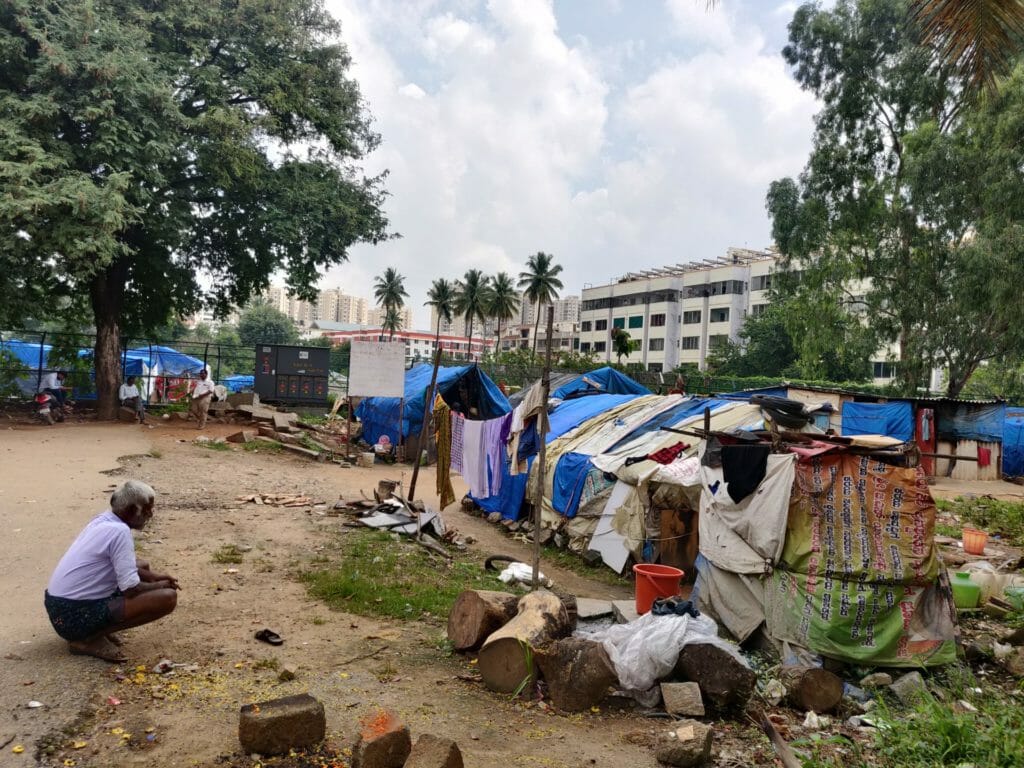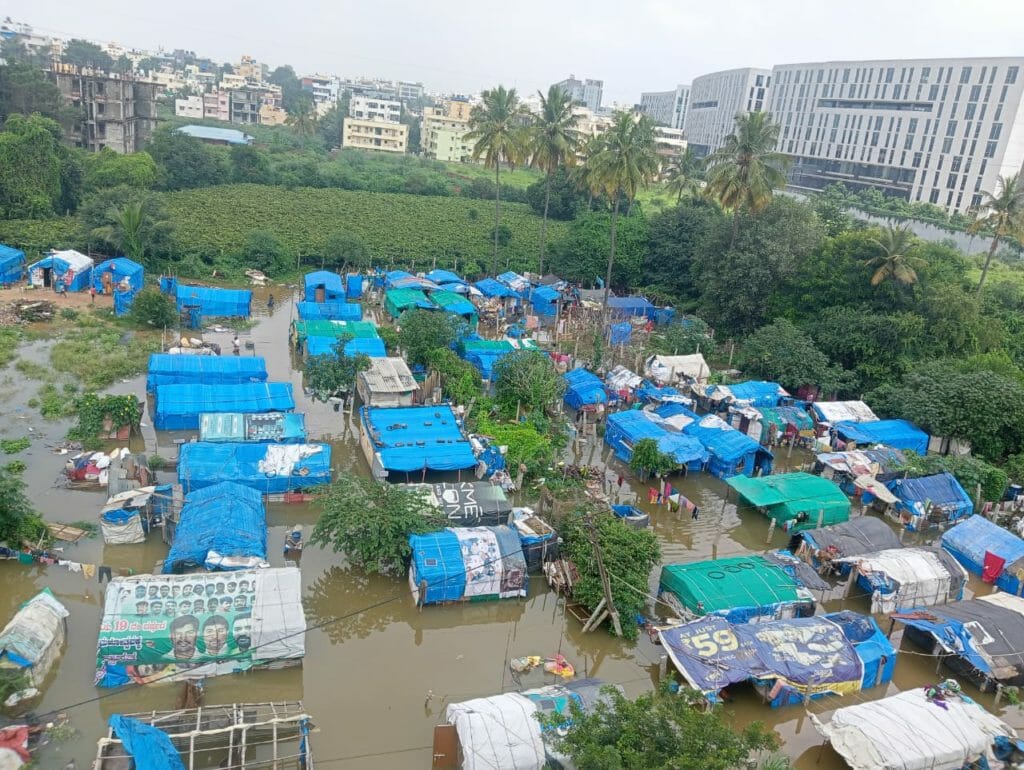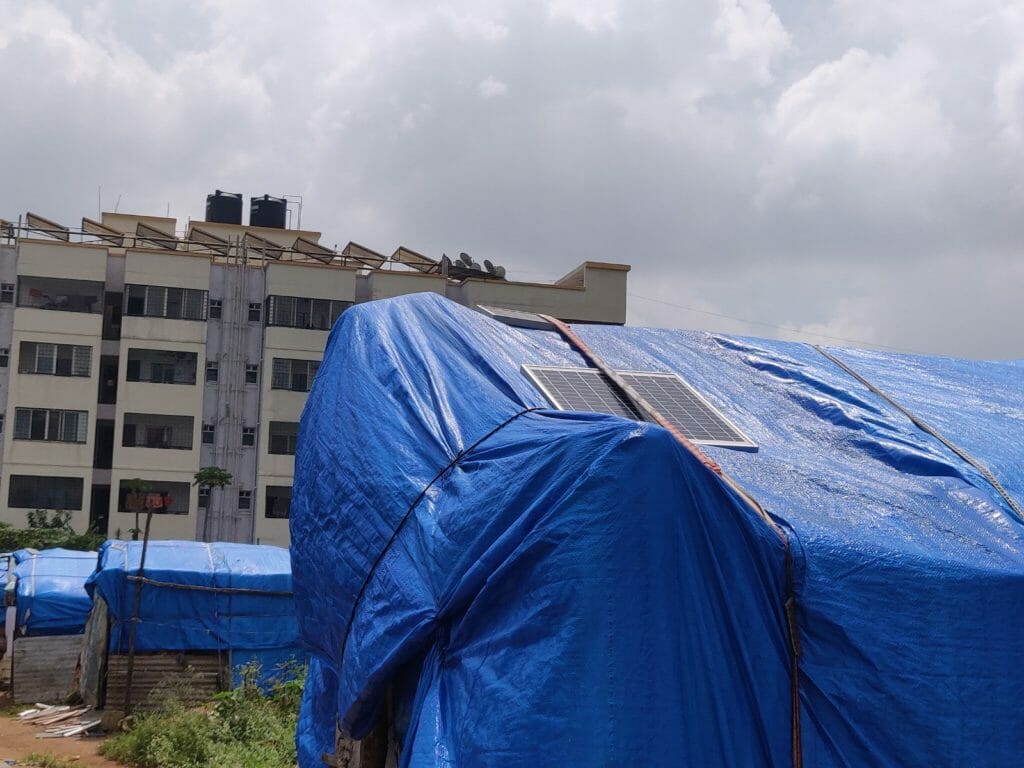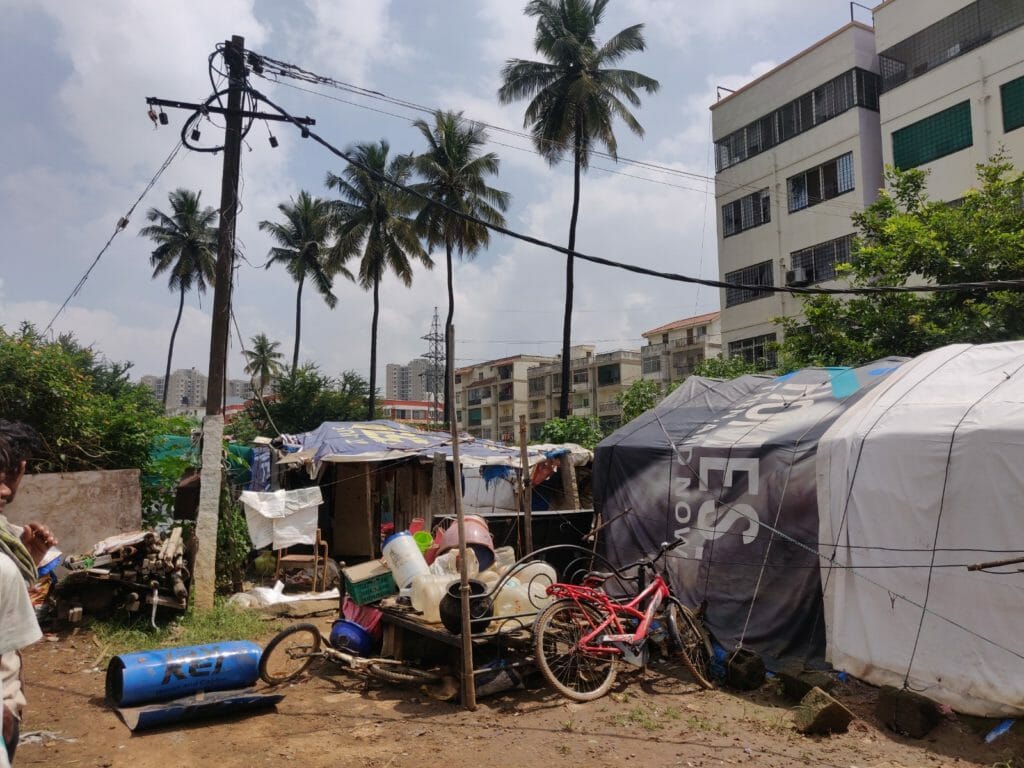“At midnight on August 30th, we woke up to thigh-high water flooding our homes,” recalls Bheemesh, a resident of an informal settlement located in Tigalarpalya, adjacent to Brookefield’s BEML Layout. “We rushed outside, barely having had the time to collect our things. When we came out, we found out that the entire settlement had been submerged”.
The last few weeks have been difficult for citizens across various regions in the city. Several bouts of heavy rainfall has inundated roads and flooded residential layouts. The Indian Meteorological Department (IMD) said this was Bengaluru’s second wettest August with 369.9mm of rainfall.

However, Bheemesh and his neighbours allege that it wasn’t the rain that wreaked havoc in their settlement but the adjacent Brigade Tech Gardens. The resident allege that the tech park had pumped out water from their flooded parking area into the settlement area, leading to their homes getting flooded.
For three days from August 31st, the affected families were temporarily housed in a community hall. They went back to their homes on September 2nd to assess the damage. But barely two days later, they were forced to move back to the community hall as a cloudburst on September 4th, which the met department said was the city’s wettest day ever, flooded their homes again.
Homes submerged overnight
The settlement is surrounded by the tech park and other building complexes. Muddy trails lead to the self-constructed homes of over 200 residents, who have no idea whether and when their ordeal will end. “We have lost bikes, appliances, clothes and ration,” says Urukunda Nayak, a BBMP sanitation worker living in the settlement. The residents comprise largely of pourakarmikas or contracted sanitation labourers working for the BBMP. Rest work as daily wage workers or housekeeping staff.

The furthest end from the entrance to the settlement faced the worst of the flooding. Urukunda said the water there had reached waist-high level. As residents could not save any of their belongings, they vacated the premises and some decided to find lodging elsewhere rather than stay in the community hall. “Some households lost their government identification cards and documents,” he added.
Their biggest loss were the solar panels they had installed and the fans they power. “They cost around Rs 6,000, and we cannot afford to replace them,” said Urukunda. With gas stoves inoperative, the residents have taken to using firewood for cooking.

Residents claim this is the first time their homes were flooded in the 20 years that they have been living there. According to All India Central Council of Trade Unions (AICCTU) functionary Appanna, the settlement is located at a level lower than the raja kaluve (stormwater drain) which caused the water to remain stagnant and homes remained submerged for days. “These residents are responsible for keeping our city afloat, can’t the state provide them with basic livable conditions?” Appanna asked.
The municipal corporation is housing the residents in the community hall for now while it debates on a more permanent solution on the issue. While food and shelter is being provided, the residents have little faith in this arrangement lasting long and are scoping out other possibilities of shelter for their families. Leaving their belongings behind and shifting out of their homes twice in less than 10 days has left them weary and dejected.
Read more: Many citizens unaware that they can claim compensation for monsoon flooding
BBMP’s efforts fall short
During the first three days of their stay in the community hall, “we received oil, pulses and 10 kgs of rice,” says Urukunda. “But only the BBMP staff were provided with ration while the rest of the residents who did not work for the municipal authority just received meals at the hall”. Which those who were forced to move back to the community hall continue to get.
Appanna says when he visited them the first night, the residents did not have a change of clothes or blankets. “The children were sleeping on the cement floor,” says Appana. “Only after we brought this to the notice of the Joint Commissioner R Venkatachalapathy of Mahadevpura zone were they offered blankets, medical attention and a place to cook”.
Venkatachalapathy mentioned that chief engineers will visit the area to survey the damage and take stock of the losses faced by residents. “Based on this the compensation will be decided,” says Venkatachalapathy. “We are also in the process of identifying government land that will be conducive to relocate the residents to”. He did not provide any information on when the compensation will be disbursed.
The residents have compiled an exhaustive list of members in each household, their bank account and ration card details to submit to the Joint Commissioner, along with the losses suffered in terms of kilograms of ration supplies, appliances and other personal belongings.
“We submitted the memorandum to the Joint Commissioner who has promised compensation and housing for the residents,” says Maitreyi Krishnan of AICCTU. “He also mentioned that action will be initiated against the Brigade company for pumping out the water”.
But Miriam Macwana, Brigade Group’s head of communications told Citizen Matters that no water had been pumped out from their premises.
The floods in May
In May 2022, the BBMP had released Rs 7.3 crore to compensate citizens who were affected by floods across all BBMP zones. The article had quoted a senior BBMP official saying that “each flood-affected house will be eligible for a maximum compensation of Rs 25,000”.
However, Citizen Matters had reported how several citizens were unaware of their eligibility to avail of this compensation. The article pegged the losses suffered by residents to be higher than the compensation that the BBMP was offering.
While relocation is an obvious solution, it comes with accompanying anxiety and hesitancy among residents about shifting schools and finding new jobs. The residents of the settlement in their present location have the assurance of their children enrolled in schools in Thubarahalli and the security of livelihoods nearby.
The bigger picture
“Informal settlements with scarce resources, poor infrastructure, fewer livelihood opportunities and knowledge gaps face considerable vulnerability to climate variability and change,” revealed a risk assessment among residents in such settlements. Meaning the realities of climate change are likely to be felt most by the urban poor, especially in informal settlements like this.
Slum-dwellers have often borne the brunt of rains and inadequate infrastructure in the recent past. In a similar turn of events, settlements of informal workers in Bellandur and Marathahalli’s Munnekollal went under water this week. People in these low-lying areas have lost their possessions, including foodgrains. Chief Minister Basavaraj Bommai has deployed the State Disaster Relief Force (SDRF) teams to tackle flooding in at least 30 locations of Mahadevapura, with a team of 30 members constituted to take up emergency works.

But these remain band aid fixes. Existing research amply proves the urban poor have little resilience to cope with the effects of unusual weather events. Yet, municipal authorities are falling way short in helping them build resilience through adequate urban infrastructure and planning that takes into account the continuing increase in the numbers of informal labour and their housing needs in Bengaluru.